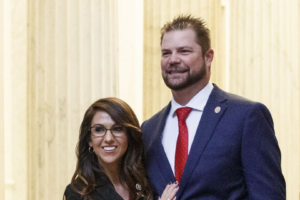Introduction to Jayson Boebert
Jayson Boebert is a figure somewhat in the shadow of his more publicly recognized wife, Lauren Boebert, who has made a name for herself in American politics. Jayson’s background is relatively understated, encapsulating the life of a man who has navigated various personal and professional realms. His relationship with Lauren places him at the heart of modern political discourse, particularly as they share a commitment to their conservative values and the advocacy for Second Amendment rights. The duo has garnered attention not only for their political stances but also for the dynamics of their partnership, which reflects a robust commitment to their shared beliefs and community involvement.
The public fascination with Jayson extends beyond just his association with Lauren. His height, for one, has generated curiosity and discussion, prompting questions regarding how it influences his public representation. While some may view height as a symbol of authority or confidence, it serves merely as one of many aspects that define his persona in the political landscape. Jayson Boebert’s height, while perhaps a trivial detail at first glance, contributes to the broader narrative surrounding his character and presence, especially in relation to public perception and media portrayal.
Moreover, Jayson’s background, characterized by hard work and perseverance, resonates with many Americans. His story entwines with that of his wife, emphasizing a shared journey through both personal challenges and public scrutiny. As we delve deeper into the factors surrounding Jayson Boebert and his height, it becomes evident that this aspect is not just a physical attribute but also a reflection of the identity he has constructed both personally and politically.
The Importance of Height in a Public Figure
Height often plays a significant role in shaping the public perception of leaders and influential figures. Various studies indicate that taller individuals are frequently associated with traits such as authority, confidence, and charisma. This sociocultural significance has been particularly noted in political arenas where height can impact a candidate’s electability and the public’s trust. For instance, research has shown that taller candidates in elections tend to garner more votes, highlighting a bias that correlates stature with capability and reliability.
In examining the stature of public figures, it becomes evident that height is sometimes intricately woven into their public persona. A prime example can be drawn from figures like former U.S. Presidents, where height seems to correlate with the perceived strength and decisiveness of their leadership. Consequently, public figures, including politicians, often become overly aware of how their height may influence their public image and the narratives surrounding their capabilities. The impression of authority associated with greater height often lends itself to a more significant portrayal in political forums and debates.
Jayson Boebert, also a public figure, brings an interesting dynamic to this conversation. While not excessively tall, his presence evokes a different narrative. His height might not place him in the category traditionally associated with political strength, but it invites questions regarding how he compensates for this perception. Observers often analyze his communication style, charisma, and public engagement, examining how these attributes may overshadow any preconceived notions about his height. Ultimately, Jayson Boebert’s height becomes a facet of a broader dialogue about the interplay of physical attributes and the qualities that define leadership in contemporary politics.

Public Perception and Media Commentary on Jayson Boebert Height
The height of Jayson Boebert, a notable political figure, has often been discussed in media contexts, influencing public perception and political discourse. Commentators and analysts have noted how Boebert’s height, which stands at a moderate six feet, is sometimes utilized as a rhetorical device in political narratives. While some view it as an assertion of physical presence, others interpret it as a symbol within broader discussions about masculinity and leadership attributes.
Social media platforms have played a significant role in shaping the conversation around Jayson Boebert’s height. Users have created memes and commentary underscoring his stature, often exaggerating characteristics for comedic effect. This playful engagement has occasionally crossed into more serious territory, fueling discussions about his capabilities as a lawmaker based on physical appearance rather than political action or policy positions. The juxtaposition between his height and his political rhetoric has become a focal point for both supporters and detractors alike.
Political analysts have also weighed in, particularly regarding how Jayson Boebert’s height might reflect on his political brand and that of his wife, Lauren Boebert. Some argue that his height contributes to an image of strength and assertiveness, potentially appealing to his base. Conversely, critics may leverage his stature to belittle or undermine his authority, casting doubt on his leadership capabilities. All of these elements weave together a complex narrative involving Jayson Boebert that extends beyond mere physical attributes, ultimately affecting how he navigates the political landscape.
The aftermath of media discussions about Jayson Boebert’s height is indicative of the broader implications of physical appearance in politics. As is often seen, the influence of such narratives can be substantial, with the potential to shape electoral outcomes and sway public opinion. It remains to be seen how these perceptions will evolve as Boebert continues his political journey.
Conclusion: Height and Personal Brand
In examining Jayson Boebert’s height and its role within the context of his political identity, it becomes evident that physical attributes can significantly influence public perception. Height is often associated with leadership qualities, confidence, and authority, which are traits that political figures strive to embody. Thus, while Jayson Boebert’s physical stature may not solely define his political effectiveness, it undoubtedly plays a part in shaping how constituents view him and his capabilities as a public servant.
Moreover, in the realm of politics, a candidate’s height can evoke preconceived notions that might affect voter behavior and opinions. Those standing at a height perceived as advantageous may benefit from a psychological edge, aligning their image with idealized characteristics in leaders. This raises the question of how societal norms surrounding physical appearances can influence electoral outcomes and the overall dynamics of public life. Height can sometimes overshadow the actual policies and ideals that candidates stand for, creating a complex interplay between image and substance.
Beyond statistics, the implications of Jayson Boebert height serve as a reminder of the broader societal constructs that inform our perceptions of authority and presence. It encourages a critical examination of how we prioritize certain physical traits over others in our evaluations of leaders. As society continues to evolve, it is crucial for us to remain aware of these biases and consider the numerous factors that contribute to effectiveness in political roles—recognizing that a candidate’s height, among many other dimensions of their identity, shapes the lens through which we view their influence and leadership.

